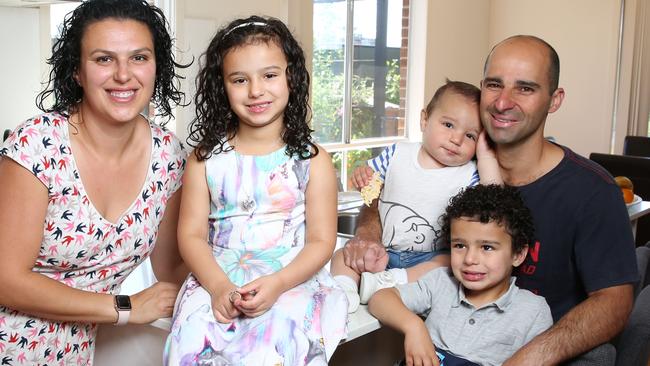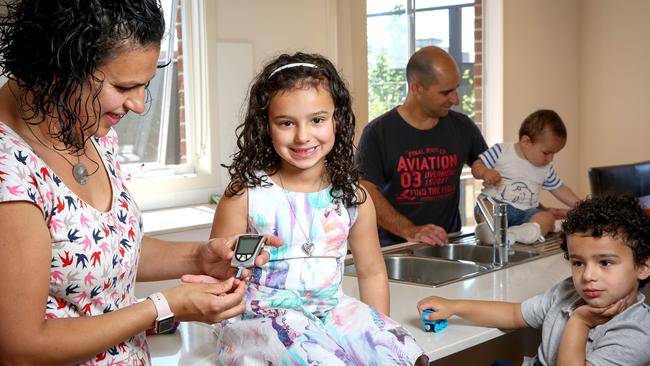Mothers’ gut bacteria could impact future health of children: new findings
THE bacteria in a mother’s gut before and during pregnancy can influence the future health of her offspring, with new findings adding to the evidence that gut bacteria does more than help process food and drink.

VIC News
Don't miss out on the headlines from VIC News. Followed categories will be added to My News.
THE bacteria in a mother’s gut before and during pregnancy can influence the future health of the offspring.
These findings pave the way for women in the future to have their gut microbes tested upon pregnancy confirmation, to determine the prescriptive diet or supplements she needs to obtain a healthy microbiome for her and her infant.
BACTERIA HOPE FOR BLOOD PRESSURE PATIENTS
Victorian researchers are among those adding to the growing body of evidence that the universe of bacteria in the digestive system doesn’t just help process food and drink, but can also contribute to immune, digestive and mental health, and obesity and chronic diseases.
Preclinical studies at the Walter and Eliza Hall Institute of Medical Research, led by Professor Len Harrison, found when mice pups weren’t colonised with their mother’s microbiome at birth, or were born without microorganisms inside them, they developed type 1 diabetes.
“Anything we come into contact with, the microbiome is the first point of entry to the body. Almost everything in the environment affects the microbiome, and therefore your health,” Prof Harrison said. “It’s emerged as an enormously important area for health.”
Prof Harrison, head of WEHI’s population health and immunity laboratory, said the microbiome — transmitted to an infant during vaginal delivery — gave a child more genes than they inherited from their parents.
“At birth, we are colonised by bacteria and other microorganisms that potentially give us million of genes. They are making substances essential for our health,” he said.
Australian researchers have undertaken an observational study of 1400 families to help untangle what triggers type 1 diabetes in such large numbers.

The blood samples four-year-old Oliver Grech gives every three months are vital pieces to the puzzle that is type 1 diabetes.
The auto-immune condition, in which the immune system destroys its own insulin-producing cells, is twice as common in children than it was 20 years ago.
Little is known about why this immune response happens, but the modern environment holds the key.
Gracie and Louis Grech enrolled their family in the study after Oliver was born, as a way of keeping tabs on his disease risk and to help future generations.
Mrs Grech found out she had type 1 diabetes when she was 21, while their daughter Amelia, 5, was diagnosed at 19 months.
There is no sign that Oliver or 16-month-old Lawrence have the condition.
SHOCK WARNING FOR AUSSIE PARENTS
HOW TO SURVIVE LIVING WITH A TEEN GIRL
BACTERIA MAY BE KEY TO HEALTH
IT is being described as the organ we never knew existed.
The gut, and the universe of bacteria that lives inside it, has emerged as one of the most powerful and promising vehicles for preventing and reversing many chronic diseases.
A string of successful preclinical studies at Monash University has seen researchers able to protect mice from developing diabetes, asthma, inflammatory bowel disease and food allergies by changing the composition of bacteria in the digestive tract.
They are now planning human trials.
Monash immunologist Professor Charles Mackay and his lab have shown that dietary fibre and fermented by-products created in the gut when fibre is broken down, influence the composition of gut microbiota and help regulate the immune system.

“This area of scientific research is exploding like very few have done before,” Prof Mackay said.
“If you change someone’s microbiome, or that of a mouse, suddenly you can make it fat or thin, or get disease or not.
“No one imagined it could be so important and potentially powerful for health.”
Prof Mackay said there were two ways to improve gut health: changing diet through “prebiotic food”, the dietary fibres that act as fertiliser for the good bacteria in the gut, and also by introducing new bacteria and probiotic supplements.
Dietary fibre is found in indigestible parts of vegetables. Resistant starch foods are also useful and include undercooked pasta, under-ripe bananas, cooked and cooled potato and rice.
“You can change your gut bacteria rapidly, and to a large degree, simply by changing your diet,” he said.
For details on taking part in the ENDIA study go to www.endia.org.au


